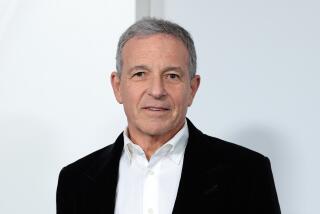Court Hears of Eisner Memo About Ovitz
- Share via
Walt Disney Co. Chief Executive Michael Eisner said in 1996 that although he’d made a mistake in hiring Michael Ovitz as company president, there was no way to avoid paying his severance, a former director testified.
Stanley P. Gold, who stepped down from Disney’s board last year and campaigned for Eisner’s ouster, testified in Delaware Chancery Court in Georgetown that the chief executive said in an unsent memo to Ovitz in December 1996 that he’d made the wrong choice in hiring the former talent agent.
“He said he made a huge mistake and the board made a huge mistake,” Gold testified. “He indicated that all of those mistakes were made in good faith and that it was going to cost the company a lot of money.”
Disney shareholders contend in a lawsuit that the company’s board deferred too much to Eisner in connection with Ovitz’s hiring in 1995 and his firing 15 months later. Plaintiffs’ lawyers value Ovitz’s severance at $140 million and are seeking to have $200 million, including interest, returned to the company.
Gold said Disney directors didn’t figure out how much the former agent would be entitled to in severance because part of the package included stock options that didn’t have to be immediately exercised.
Gold recalled telling his colleagues at a 1996 meeting that Ovitz’s ouster “would cost a boatload of money.”
In internal memos introduced as evidence at the trial, Eisner painted Ovitz as a “psychopath” who couldn’t be trusted to perform competently.
Gold said he didn’t recall Eisner’s ever referring to Ovitz as a “psychopath” and would have discounted such a statement. He added that Ovitz’s and Eisner’s conflicts were a clash of egos.
“I think of a psychopath as someone like Charlie Manson,” Gold said, referring to the cult leader and convicted mass murderer. “Michael Ovitz is not a psychopath and he’s not totally incompetent.
“These were two, big volatile egos banging together and not getting along,” Gold said earlier in his testimony.
He also described the disputes between Ovitz and Eisner, along with other Disney executives, as “petty bickering” that left the company in a state of “suspended animation.” That’s why directors supported Eisner’s decision to fire Ovitz, Gold said.
Gold said his own problems with Eisner began in 2000 when the company’s earnings began to fall. Any director who questioned whether Eisner’s performance was partly to blame for the slide was “isolated,” he said.
“It was only when earnings began to fall off that he started taking revenge against board members who pointed out the poor results,” Gold testified.
More to Read
The biggest entertainment stories
Get our big stories about Hollywood, film, television, music, arts, culture and more right in your inbox as soon as they publish.
You may occasionally receive promotional content from the Los Angeles Times.









